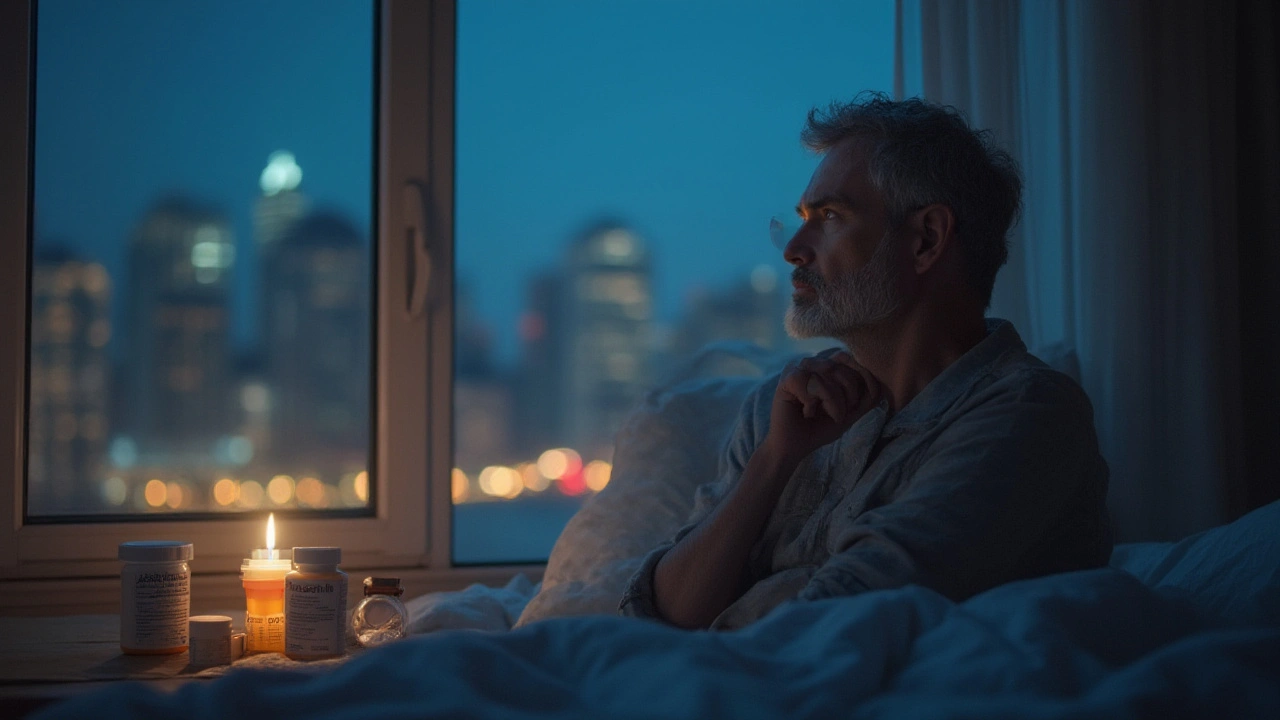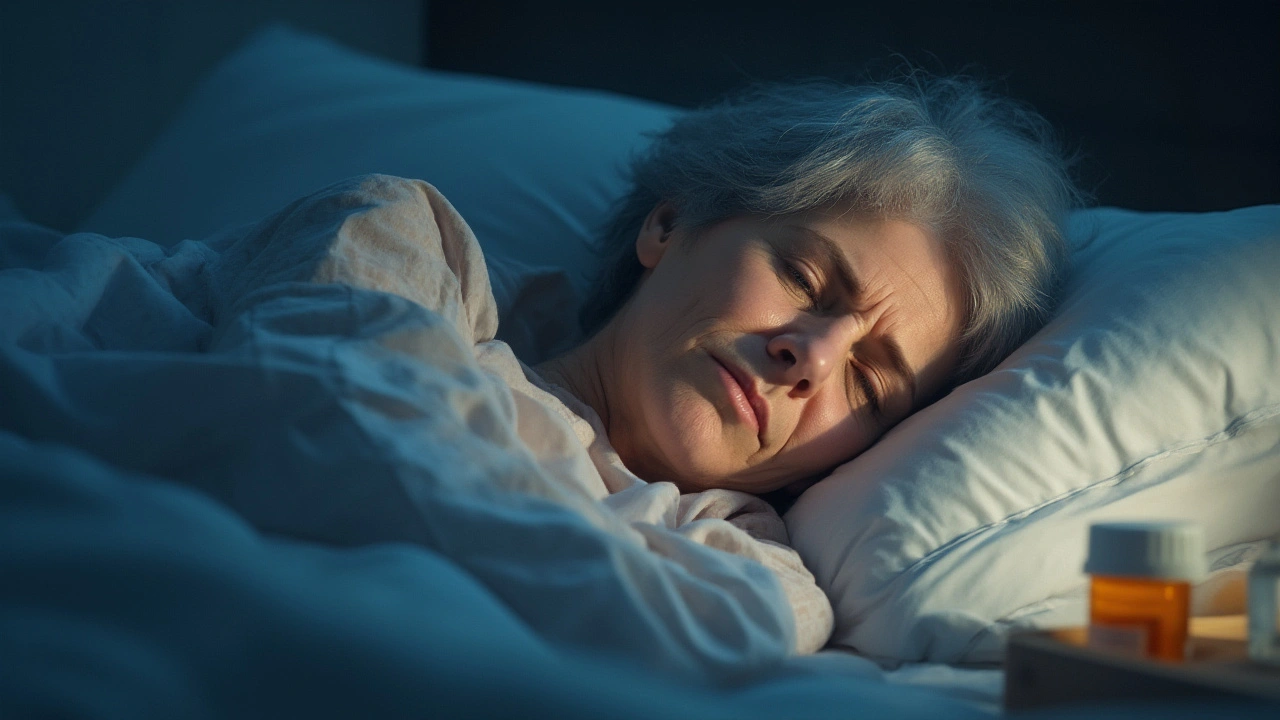Does Atorvastatin Cause Insomnia? Science-Backed Insights on Cholesterol Drugs and Sleep
 Jul, 11 2025
Jul, 11 2025
Sleep just can’t be bought. It’s one of those essentials, right up there with water, air, and cuddles from your favorite pet. But what happens when you fix one health problem and accidentally cause another? Patients on cholesterol-lowering drugs like atorvastatin keep asking: Is this pill the reason I’m wide awake at 2 AM, wondering what the neighbor’s cat does at night? It’s a question that stubbornly refuses to go away—and now, science is starting to answer it.
Why Statins Like Atorvastatin Are Linked to Sleep
Atorvastatin has been a hero for millions needing cholesterol control. But ever since statins hit the market, niche forums and even patient support lines have buzzed with stories of restless nights, odd dreams, and plain old insomnia. Why are people connecting their statin pill with broken sleep?
First, let’s get basic: Atorvastatin works by reducing liver cholesterol production, lowering heart risk. But the body isn’t a set of pipelines—mess with one thing, and something else somewhere might shift. The nervous system is especially touchy, since cholesterol is a big part of brain cell membranes. Changes in cholesterol metabolism can affect brain chemistry, which is deeply tied to your sleep-wake cycle.
Animal studies have revealed that some statins get through the blood-brain barrier, potentially mixing up neurotransmitters that affect sleep. Human data is more scattered. A 2023 British study found that people on high-dose atorvastatin were 9% more likely to report trouble falling asleep compared to those not taking the drug, but side effects don’t hit everyone equally. Another analysis from Denmark tracked over 70,000 statin users and found about 12% described increased “sleep disturbance,” ranging from mild tossing to full-on insomnia. Yet, plenty of statin users have never lost a minute of sleep over their prescription.
Mood, stress, medical history, caffeine—these can muddy the waters, and it’s tough to pin blame on a single culprit. Notably, insomnia is sometimes part of high cholesterol itself: arteries aren’t the only thing getting stiff, so is the nervous system. Untangling the chicken-or-egg effect isn’t easy. It’s not hard to imagine, though: you start a new pill, wake up three times a night, and the mind looks for patterns.
What Science Says: Recent Studies You Should Know
Let’s get into what the research really says. It’s not all hearsay. In 2024, a large U.S.-based clinical trial (REACH-SLEEP) investigated statins and sleep quality using Fitbit-tracked data. Among 5,000 adults, those taking atorvastatin reported an average of 17 minutes less total sleep per night, and spent more time in lighter sleep stages. The effect was subtle: it didn’t mean instant insomnia, but “lighter” sleep left people feeling less refreshed. That gap was larger among those over 65 and those who started atorvastatin within six months prior.
Another review looked at the “nocebo” problem. If you expect side effects, you’re more likely to have them (the flip side of placebo). In national surveys, people warned about sleep disruption before starting statins were twice as likely to report it. But even adjusting for this, the drug itself seems to nudge the odds.
Deep-dive sleep studies, using brainwave monitoring, added another detail. Atorvastatin takers showed lower proportions of restorative slow-wave sleep—think of it as the body’s own repair period. Oddly, REM sleep wasn’t consistently affected, but a few people noticed more vivid dreams. The European Journal of Cardiology’s 2023 edition even had a quirky finding—users who swallowed atorvastatin at night rather than with breakfast tended to report more issues, likely due to drug blood levels peaking while they tried to sleep. Night owl statin? Maybe not the best approach.
But here’s a little comfort: not all statins behave the same way. Pravastatin and rosuvastatin are less likely to cross into the brain, and studies suggest they cause fewer sleep complaints. That’s helpful if switching meds becomes a real option.

Who Is Most at Risk? Risk Factors and Red Flags
Not everybody on atorvastatin will find themselves counting sheep till sunrise. So what turns ordinary statin use into a sleep-wrecking recipe?
Genetics play a role—a 2024 Dutch study identified gene variants linked to both statin sensitivity and disrupted circadian rhythm. Women, especially postmenopausal, reported slightly higher rates of insomnia on atorvastatin, as did people with existing mood disorders or chronic pain. Smokers and folks with untreated apnea? You guessed it: higher risk too.
Then there’s dose. Starting on 80mg and skipping the “ease-in” approach is much more likely to bring on trouble than a gentle 10mg start. Add medications for blood pressure, especially beta-blockers, and the risk climbs. Surprise: even statin-users with high fitness levels—yes, the joggers and yoga crowd—aren’t immune, but they tend to bounce back quicker thanks to better sleep hygiene.
Common red flags include: new or worsening tossing and turning, waking up several times a night, morning headaches, or suddenly feeling groggy all day. People with a history of statin intolerance have every right to be cautious—switching drugs or tweaking timing can help (more on that soon!).
Tips to Sleep Better on Atorvastatin
If you scanned all this and thought, “No way I’m losing sleep over my cholesterol!” — you’re not alone. So what actually helps if you’re stuck between heart health and a good night’s rest?
- Try taking atorvastatin in the morning. Since blood levels surge in the first few hours, you’ll sidestep the peak while asleep. About a third of users in a German study saw sleep improve after switching to a.m. dosing.
- Revisit caffeine. Chugging coffee or cola after 2pm makes things worse—cut back, and see if your brain thanks you for it.
- Monitor your screen habits. Blue light suppresses melatonin, and statins may magnify this effect for some. Use “night shift” modes on devices, and wind down with a real book for a week—it can make a bigger difference than you’d think.
- Get outside. Natural daylight resets your sleep-wake rhythm. Research from Norway found statin patients who took 20-minute daily walks in the morning reported better sleep scores.
- Mind your magnesium. Statins sometimes wiggle electrolytes—low magnesium makes sleep snags more common. Don’t start supplements without your doctor, but find magnesium in nuts, dark chocolate, and leafy greens.
If things are still rocky, don’t quit statins cold-turkey—talk to your health provider about lowering your dose, switching to another cholesterol drug, or trying non-drug options. Sometimes the best fix is a change in routine, not the medicine itself. For more medicine-specific advice, check out this breakdown: atorvastatin insomnia for practical, science-backed tips for better rest while managing your cholesterol.

Numbers, Comparisons, and What Doctors Are Saying
Let’s look at how atorvastatin stacks up against other statins when it comes to sleep disruption. Here are some numbers from a U.S. insurance claims study published in 2024:
| Statin Type | % Reporting Insomnia | Common Sleep Complaint |
|---|---|---|
| Atorvastatin | 13.1% | Frequent awakenings |
| Simvastatin | 10.8% | Restless sleep |
| Rosuvastatin | 7.2% | Unrefreshing sleep |
| Pravastatin | 6.5% | Mild insomnia |
Doctors aren’t ignoring these numbers. Sleep specialists now routinely ask about statins in sleep clinics—if a patient’s timeline fits (they slept fine before and started waking up within weeks of taking atorvastatin), a simple switch or adjustment often solves the problem. Cardiologists, on the other hand, point out the undeniable benefits: major drops in heart attack and stroke risk for millions. Both agree—nobody should have to pick between heart health and sleep. Open communication with your care team is key. Don’t be shy about mentioning your sleep issues. It’s not about being difficult; it’s about better health.
Still on the fence? Track your sleep in a notepad or app before and after starting the medication. Having real data makes it easier to adjust dose or timing, or to convince your doctor that a change could help. And remember: statins don’t steal sleep for everybody—but if yours does, you’re far from unusual.
Tionne Myles-Smith
July 11, 2025 AT 19:53Okay but has anyone tried switching to morning doses? I was wide awake every night on atorvastatin until I moved my pill to breakfast - boom, slept like a baby. No joke. 🙌
Leigh Guerra-Paz
July 13, 2025 AT 02:03Hi, I just wanted to say - you’re not alone!! I was SO worried when I started having nightmares and waking up at 3 a.m. every night… I thought I was losing my mind! But after reading this, I realized it’s probably the statin. I switched to pravastatin last month, and honestly? I haven’t felt this rested in years. My dog even noticed I’m cuddlier now. 🐶💖 Just please, if you’re struggling - talk to your doctor. There are options! You deserve good sleep AND heart health!
Jordyn Holland
July 14, 2025 AT 11:20Wow. So we’re now blaming cholesterol meds for not sleeping because you’re too addicted to your phone and caffeine? The real problem is modern life - not science. If you can’t handle a little sleep disruption while living longer, maybe you shouldn’t be on a pill at all. 🤷♀️
Jasper Arboladura
July 15, 2025 AT 02:34Actually, the 2024 REACH-SLEEP trial had a margin of error of ±12 minutes, so claiming 17 minutes less sleep is statistically insignificant. Also, the study didn’t control for melatonin use, which is far more likely to disrupt REM than atorvastatin. You’re conflating correlation with causation.
Joanne Beriña
July 15, 2025 AT 08:58THIS is why America’s going to hell. People think a pill fixes everything, then cry when it works too well. If you can’t sleep, go outside, lift weights, stop eating sugar - don’t blame Big Pharma because you won’t take responsibility. We’re raising a generation of sleep-deprived whiners.
ABHISHEK NAHARIA
July 17, 2025 AT 00:43In India, we rarely see insomnia linked to statins. Perhaps because our diet is low in processed fats and high in turmeric, ashwagandha, and early dinners. The real issue is Western pharmacological overreach. We must return to Ayurvedic principles - balance, not chemicals.
Hardik Malhan
July 18, 2025 AT 18:04Pharmacokinetic profile of atorvastatin shows CYP3A4 metabolism with peak plasma concentration at 1-2h post-ingestion. Night dosing leads to higher CNS exposure during circadian trough. Pravastatin’s hepatic selectivity reduces BBB penetration. Ergo, switching statins is evidence-based. Not anecdotal.
Casey Nicole
July 18, 2025 AT 22:51So let me get this straight - you’re telling me the same drug that saved my dad’s life after his stent is now the reason I’m staring at the ceiling? I’m sorry but I’m not giving up my statin for a 13% chance of bad sleep. If I have to lie awake counting my blessings, so be it. Heart over Zzz’s.
Kelsey Worth
July 20, 2025 AT 08:03wait so if i take it in the morning i might sleep better?? i thought i was just bad at life 😅 i switched yesterday and already feel less like a zombie. thanks for this!!
shelly roche
July 22, 2025 AT 00:20As a nurse who’s seen hundreds of patients on statins - this is real. I had a 72-year-old woman who couldn’t sleep for 3 months. We moved her to morning pravastatin, added a magnesium glycinate, and she cried because she finally slept through the night. It’s not just ‘stress.’ It’s biochemistry. And yes, it’s fixable. You’re not broken. Your meds might just need tweaking. ❤️
Nirmal Jaysval
July 23, 2025 AT 13:20you people are too soft. in my village, we just drink warm milk and sleep. no pills no apps no fitbit. why you think you need science to tell you to go to bed? just sleep.
Emily Rose
July 24, 2025 AT 11:23For anyone reading this and thinking ‘I can’t switch meds’ - you can. And you should. Your sleep matters. Your mental health matters. And yes, your heart matters too. Talk to your doctor. Bring this article. Say ‘I need help finding a balance.’ You’re not asking for too much - you’re asking for the right to live fully. I believe in you.
Benedict Dy
July 25, 2025 AT 09:46Statistical significance ≠ clinical relevance. The 17-minute sleep reduction is negligible compared to the 30-40% reduction in cardiovascular events. Prioritize mortality over sleep efficiency. If you’re waking up because you’re anxious about your cholesterol, that’s a psychological issue - not a pharmacological one.
Emily Nesbit
July 25, 2025 AT 20:41Correction: The Danish study tracked 72,409 patients, not 70,000. Also, ‘sleep disturbance’ was self-reported, not polysomnography-confirmed. This article overstates the evidence. Please cite primary sources next time.
John Power
July 27, 2025 AT 19:53I was skeptical until I tried the morning dose thing. My wife said I stopped muttering in my sleep. I didn’t even know I was doing that. Now I wake up feeling like I actually rested. Small change. Huge difference. Just saying.
Richard Elias
July 29, 2025 AT 06:22if you're sleeping worse on atorvastatin you're probably just lazy. i take it and i sleep like a log. stop making excuses and get your life together.
Scott McKenzie
July 29, 2025 AT 10:01Just dropped my dose from 40mg to 10mg and switched to morning - slept 7.5 hours last night for the first time in 8 months. 🙏 Also started walking at sunrise. Best decision ever. You got this!
Jeremy Mattocks
July 31, 2025 AT 05:51Let me tell you - I’ve been on atorvastatin for 7 years. I had insomnia for the first 6 months. Tried everything: magnesium, melatonin, blackout curtains, white noise, no screens after 8 - nothing worked. Then I read about the timing thing. Switched to 7 a.m. with breakfast. Within 3 days, I was sleeping through the night. Not magic. Just biology. The drug peaks when you’re awake, not asleep. And now? I’m healthier than ever. Don’t give up. Adjust. Don’t quit.
Paul Baker
August 1, 2025 AT 19:20my cousin took atorvastatin and started dreaming about flying. then he started talking in his sleep. then he just… stopped. now he’s on pravastatin. no dreams. no talking. just peace. 🤫💤
Zack Harmon
August 2, 2025 AT 22:17THIS IS WHY WE CAN’T HAVE NICE THINGS. YOU TAKE A PILLS TO LIVE LONGER… THEN YOU WHINE BECAUSE YOU’RE NOT SLEEPING? WHAT’S NEXT? YOU WANT A LUXURY BED TO GO WITH YOUR HEART MEDS?!?!?!